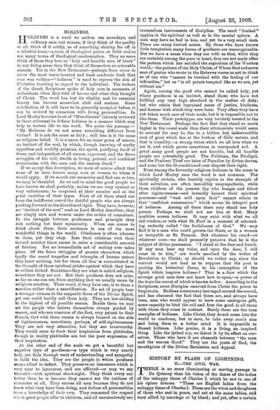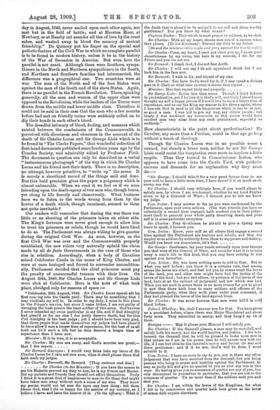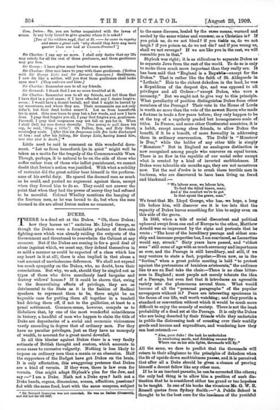HISTORY BY FLASH OF LIGHTNING. IL — THE CIVIL WAR.
/THERE is no more illuminating or moving passage in I_ De Quincey than his vision of the dance of the ladies of the unhappy times of Charles I. which he saw in one of his opium dreams. "These are English ladies from the unhappy times of Charles I. These are the wives and daughters of those who met in peace, and sat at the same tables, and were allied by marriage or by blood; and yet, after a certain day in August, 1642, never smiled upon each other again, nor met but in the field of battle; and at Marston Moor, at Newbury, or at Naseby cut asunder all ties of love by the cruel sabre, and washed away, in blood the memory of ancient friendship." De Qiiincey put his finger On the special and pathetic feature of the-Ciiril War to which no complete parallel is to be found in modern history, unless it be in the history of the War of Secession in America. But even here the parallel is not exaCt. Although there were Southern sympa- thisers in the North and Northern sympathisers in the South, and Northern and Southern families had intermarried, the difference was a geographical one. Two countries were at war. The men of the North and of the free States were against the men of the South and of the slave States. Again, there is no parallel in the French Revolution. There, speaking generally, all the men and women of the upper class were opposed to the Revolution, while the leaders of the Terror were drawn from the middle and lower middle class. Therefore it could not be said in their case that the men who a few months before had met on friendly terms were suddenly called on to dip their hands in each other's blood.
The dreadful intimacy of blood, feeling, and manners which
existed between the combatants of the Commonwealth is perceived with ;directness and clearness in the account of the death of Sir Charles Lucas and Sir George Lisle which is to be found in "The Clarke Papers," that wonderful collection of first-hand documents published some fourteen years ago by the Oamden Society, and admirably edited by Professor Firth. The document in question can only be described as a verbal
instantaneous photograph" of the way in which Sir Charles Lucas and his friend met their death. There is no description, no attempt, however primitive, to "write up" the scene. It is merely a shorthand record of the things said and done. But this bald precision gives the paper a poignancy which is almost unbearable. When we read it we feel as if we were intruding upon the death-agony of two men who, though brave, yet clung to life fiercely and clamorously. What business have we to Eaten to the words wrung from them by the horror of a death which, though imminent, seemed to them not quite inevitable?
Our readers will remember that during the war there was
little or no shooting of the prisoners taken on either side. The King's fortunes were never good enough to allow him to treat his prisoners as rebels, though he would have liked to do so. The Parliament was always willing to give quarter during the original Civil War. As soon, however, as the first Civil War was over and the Commonwealth properly established, the new rulers very naturally upheld the claim made by all de facto Governments in the case of those who rise in rebellion. Accordingly, when a body of Cavaliers seized Colchester Castle in the name of King Charles, and were at once besieged and forced to surrender uncondition- ally, Parliament decided that the chief prisoners must pay the penalty of unsuccessful treason with their lives. On August 28th, 1648, Sir Charles Lucas and Sir George Lisle were shot at Colchester. Here is the note of what took place, abridged only for reasons of space :— "Colchester, 28th August, 1648. Sir Charles Lucas speech att his first coming into the Castle yard : There may be something that I May vindicate my self in. In order to my duty, I came to this place in the Prince's service, but since I came hither, I am not guilty of wronging the least person the least soldier of this army. God knowes I never intended my owne particular in my life, and if God Almighty bad pleas'd as for my sins I doe justly deserve death, but for this Czod Almighty is the best judge ; yet I should have been very glad, that those people that made themselves my judges had been pleas'd to have allow'd :nee a longer time of repentance, for the best of us all bath not liv'd such a life but he does deserve a longer time of repentance than I have now.
Minister : If it be true, it is as acceptable.
Sir Charles : My sins are many, and God's mercies are great,—
that I doe expect
Sir Bernard Gascoyne: I would very faints take my leave of Sir Charles Lucas for I care not how soon, when it shall please those God bath made my judges.
Sir Charles : Farewell, Sir Bernard. [They embrace and kiss.] Sir Charles (to the Minister): If you have the means to
see his Majestie present my duty to him, he is my Prince and Master. Bid my parents and friends they should not afflict themselves. Truly
think it is s groat deal of happinesse to mee (to die thus) God might have taken mee away without such a sense of my sins. They know my genius would not let mee die upon any base thing : bid thorn blesse God, that I die so happy for the service of my country, as I believe I Jams. and have the honour of it. (To the . Officers): What is
. the death that is pleas'd to be assign'd to my self and these worthy gentlemen ? Doe you know by what means ?
Captain Packer : That which is most proper to soldiers, to be shot. Sir Charles: With all my heart, shoot° mee out of a cannon when they please. (To his Kinsman): Present my duty to my father.
[He and he minister retire aside and pray against the Castle wall.] Sir Charles: Come, my heart, I need not cheer you up, I know your cheerfulness° by my owne, but here is my amends, I die for my Prince and you die not see.
Sir Bernard: I thank God, I doe not fear death.
Sir Charles : I will not say I do not apprehend death but I can look him in the face now.
Sir Bernard: I wish to die, and repent of my sins.
Sir Charles : You have God's word for it, if I may speak a divines part in it (that) at what time (soever) a sinner does repent . . .
Minister : Hoe that repent truly and properly Sir George Lisle: Better late than never. Though I don't believe in predestination, yet I believe it is God's will, and truly I should have thought my self a happy person if I could live to hare a larger time of repentance, and to see the King my master in his throne again, whom I beseech God to send to all the happinesse which is due to so just, so good • a man. I was bid to goe my way, say divers per pie: but truely I was confident my inn:monde in this action would have rendred nice very clear from any such punishment, especially so suddenly."
How characteristic is the point about predestination! No Cavalier, any more than a Puritan, could in that age go long without a touch of theology.
Though Sir Charles Lucas was in no possible sense a coward, but clearly a brave man, neither he nor Sir George Lisle could resist the temptation once more to implore a little respite. Thus they turned to Commissioner Ireton, who appears to have come into the Castle Yard, with pathetic excuses and demands for an explanation why they must die :—
"Sir George: I should take it for a very great favour done to my poor soul to have a little more time, I have desery'd it as much as an enemy can doe.
Sir Charles : I should very willingly hear, if you would please to satisfy mee, by whom I am condemned, whether by my Lord Fairfax alone, or by a Councell of Wary; I beseech you to lett me know my judge.
Corn. Ireton: I may answer so far as you were condemned by the Parliament, upon your owne actions. (The war) wherein you have so
voluntarily a second time engaged, bath rendred you in their judge- ment (and) in generall your whole party deserving death, and your self is in some particular exception.
Sir Charles : Pray Gentlemen be pleas'd to give a dyeing man
leave to speak, I beseech you. •
Corn. Ireton: Know, your self as all others that engage a second time against the Parliament are traitors and rebells, and they doe employ us as soldiers by authority from them to suppress° and destroy.
Would you know our commission, itt's that
Sir George : Gentlemen, lay your bands seriously upon your breasts you that were of the Council of Warr, and consider what it is to take away a man's life in this kind, that you may have nothing to rise against you hereafter.
Corn. Ireton: Sir, wee have nothing more to add to that. But to what you said before ; you know it is a certaine rule, that among
armes the lanes are silent, and had not you by armee stopt the lawes of the land, you and other men might have had the justice of the lame: of the land ; but you and others, by pretence of the lawes of the land, have stopt the current of judgement and law which wee had. When you are melt in armee there is no more reason for you to plead it now then there bath been to many soldiers and officers of the Parliaments party, when they mat some under your command, it they had pleaded the lawes of the land against them.
Sir Charles : It was never known° that men Were kill'd in cod blood before.
Colonel Whalley : Sir, shall I answer you for that. You have giiad us a president before, where there was Major Wandstead and about forty more. They submitted to mercy, and they hang'd up 14 of them.
Ensigns —. May it please your Honour I will satisfy you.
Sir Charles : If the Generall pleases, a man may be mercifull, and satisfy both his mercy, and the world besides, and justice. I doe here beseech the Generall that he will be pleased to looke upon tnee in that nature as I am in his power, that he will excuse mee with my life, if I can but obtain° the General's mercy and favour (to me) and these gentlemen : and if it be not, God's will be done, I must submitt to it.
Corn. Ireton: I have no more to say to you, nor is there any other • judgement that wee have received from the General!, but you being persons who being in armee and hostility against the Parliament, he may as justly kill and give no quarter to you as ever any was in this wen% He haying given you no assurance of quarter nor any of you, has only determined to yourselves in particular, that you are not in the compass° of quarter. Tia no more than if the soldiers mett you and shot you.
Sir Charles: I am within the lawes of the Kingdoms, for what I did is by commission and quarter bath been given as the 'awes of armee cloth require elsewhere. Corn. Ireton Sir, you are better acquainted with the lama of armes. Is any body bound to give quarter where it is asked ?
[Two of the soldiers sayd, that at St. — he came in ?ageing -and.rwore a great oath why should they have any more quarter than wee had at Cannon-Frooine . . . . . .
Sir Charles : I can say no more. I shall only desire that my life may satisfy for all the rest of these gentlemen, and these gentlemen may goo free.
Sir George : I have given many hundred men quarter.
Sir Charles : Give meo leave to pray with these gentlemen. (Retires with Sir George Lisle and Sir Bernard Gascoyne.) Gentlemen, I now die like a soldier, will you that these gentlemen shall looke upon mee ? (They embrace and kisse.) Sir Charles Remember mee to all my friends.
Sir Bernard: I thank God I am no more troubled at it.
Sir Charles: Remember mee to all my friends, and tell them that I have died in a good cause; if I have offended any I desire forgive- nesse. ; I would have a decent buriall, and that I might be buried by my ancestours, and where they are. Their monuments are not only defac't, but their dead bodies remov'd. Let us from henceforth lye in quiet. Give mee leave to pray but a few words, and now I have done. I pray God forgive you all, I pray God forgive you, gentlemen. Farewell, I pray God vengeance may not fall on you for it. When I shall (fall) lay nice downe decently. [One goeing to pull down his cap, he said, Stay a little] Oh Father, Son, and Holy Ghost, receive)nay souk:. [After this six dragoones with fire lochs discharged at him and after his falling, Sir George Lisle, having kissed him, was also shot to death.]'*
Little need be said in comment on this wonderful docu- ment. "Let us from henceforth lye in quiet" might well be taken as a motto for the tragedy of the Commonwealth Wars. Though, perhaps, it is natural to be on the side of those who suffer rather than of those who inflict punishment, we cannot doubt that Ireton's action was justified. With what a nobility of restraint did the great soldier bear himself in the perform- ance of his awful duty. He spared the doomed men as much as be could, and pushed no argument against them, except when they forced him to do so. They could not answer the point that when they had the power of mercy they had refused to be merciful. Colonel Whalley mentions the hanging of the fourteen men, as he was bound to do, but when the men doomed to die are silent Ireton makes no comment.








































 Previous page
Previous page